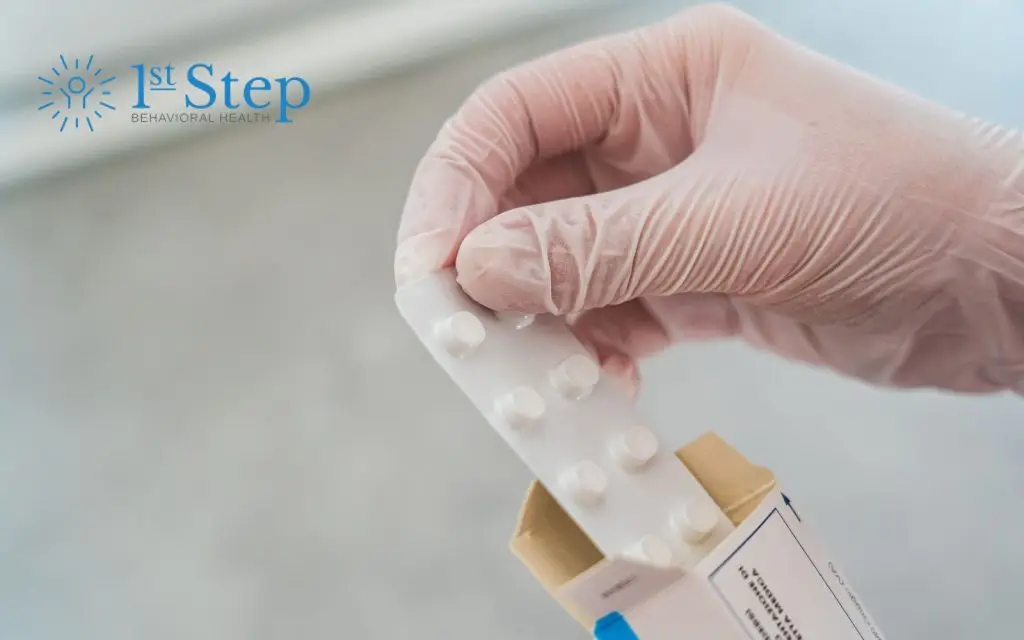Millions of people use prescription antidepressant medications to treat depression. Remeron is a common antidepressant drug used to treat depression and other conditions. It has a risk of abuse and addiction.
This article will explore the potential for Remeron addiction. You will learn:
- How Remeron works
- The side effects of Remeron abuse
- Signs of Remeron addiction
- What to expect in Remeron addiction treatment
- Where to find comprehensive treatment and support
If you or someone in your life struggles with prescription drug abuse or addiction, you are not alone. Contact the intake specialists at First Step Behavioral Health to learn about our treatment and recovery support programs. You may reach out to verify your insurance, schedule appointments, or ask questions.
What is Remeron?
Remeron (mirtazapine) is an FDA-approved prescription antidepressant. It is a tricyclic antidepressant used to treat major depressive disorder (MDD). Doctors may sometimes prescribe it to treat other mental health issues, including:
- Generalized anxiety disorder (GAD)
- Obsessive-compulsive disorder (OCD)
- Social anxiety
Remeron has a low risk of abuse and addiction. However, people may still abuse it and develop physical dependence.
Can You Get Addicted to Remeron?
Remeron works by slowing down central nervous system (CNS) activity. This can lead to feelings of sedation and calm. Some people may like these effects and begin to misuse Remeron.
Research shows that the risk of mirtazapine addiction is relatively low. However, some people abuse Remeron by taking higher doses or taking it more often than prescribed. Long periods of Remeron abuse can lead to physical dependence.
People who become physically dependent on Remeron may experience withdrawal symptoms if they stop taking it. Common Remeron withdrawal symptoms include:
- Depression
- Tingling or prickling sensations on the skin
- Nausea and vomiting
- Irritability
- Dizziness
- Headaches
- Nightmares
People with Remeron dependence require comprehensive addiction treatment programs to stop taking it safely.
Side Effects and Risks of Remeron Abuse
Remeron decreases CNS activity, leading to a reduction in anxiety symptoms. However, it also has the potential to cause unwanted side effects, including:
- Drowsiness
- Constipation
- Body aches
- Vomiting
- Diarrhea
- Weight gain
- Difficulty with concentration and focus
- Strange dreams
People may also experience more severe risks associated with Remeron, including increased depression and suicidal thoughts. Some people may experience anxiety, agitation, and irritability.
Abusing Remeron increases the risk of unwanted or dangerous side effects. It is essential to watch for the side effects and signs of abuse. Some signs of Remeron abuse include:
- Finishing a prescription early
- Taking more of a drug than prescribed (higher or more frequent doses
- Spending a lot of time and energy thinking about Remeron or getting more of the drug
- Doing illegal or dishonest things to get more Remeron
- Exhibiting significant behavioral, emotional, or physical changes
- Needing to take more Remeron to get the desired effects
- Experiencing withdrawal symptoms if you stop taking it
Seek treatment as soon as you recognize Remeron abuse or addiction.
Remeron Addiction Treatment
It can be challenging to overcome Remeron abuse and addiction. However, getting the right level of treatment and support can help. Comprehensive treatment programs help people address the complex roots of prescription drug abuse and move forward.
Remeron addiction treatment typically occurs in stages. Here is an overview of what to expect during treatment.
Assessment
Before you begin a detox program, your treatment team will assess your needs. This assessment may include:
- Information about your past and current substance abuse
- A complete mental and physical health history
- A family history of substance abuse or addiction
- Your history of addiction and treatment
- A physical exam
- Lab testing
This assessment will allow your treatment team to identify any issues that could complicate detox. It also helps them tailor your treatment to meet your unique needs.
Detox
Your holistic detox treatment plan may include:
- Medications to manage cravings and other withdrawal symptoms
- Round-the-clock supervision and access to treatment
- Emotional support, including individual and group counseling
- Holistic therapies like yoga, mindfulness, and nutrition support
- A secure, supportive environment
A supportive detox program allows your body to detoxify safely and prepares you for comprehensive treatment.
Treatment
A comprehensive prescription drug addiction treatment program addresses the complex roots of addiction. Completing a treatment program can help you work toward long-term recovery.
A holistic Remeron addiction treatment program may include:
- Mental health care
- Cognitive behavioral therapy (CBT) and other behavioral therapies
- Medication management
- Individual and group therapy
- Education and counseling for family members
- Relapse prevention education
- Holistic therapies like exercise, mindfulness, creative therapies, and nutrition support to soothe the mind and body
Prescription drug addiction treatment programs are available in inpatient and outpatient settings. Your treatment team will assess your needs and recommend the appropriate level of care.
Find Addiction Treatment
If you or someone you love struggles with Remeron abuse or addiction, you are not alone. Find effective, compassionate treatment programs at First Step Behavioral Health. Contact our intake team to explore our holistic treatment and recovery support options or to schedule an intake appointment.
References:
- National Alliance on Mental Illness (NAMI): Mirtazapine (Remeron)
- U.S. Food and Drug Administration (FDA): Remeron (mirtazapine) tablets
- National Institute of Health (NIH): Investigating the potential of mirtazapine to induce drug-seeking behavior in free-choice drinking mouse model

